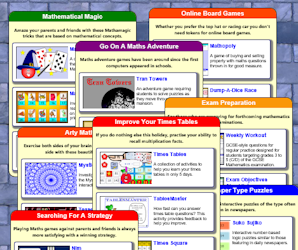20 mathematical activities for the school holidays
Tuesday 1st August 2017
Welcome to the Transum mathematics newsletter for August 2017 wherever in the world you are. Some of you are enjoying the long school summer holidays while for others it is business as usual. Before getting on to the main theme of this missive let’s begin with this month’s puzzle.I have randomly selected two different whole numbers. They aren’t both odd. What is the probability that they are both even?The answer is at the end of this newsletter but now let’s move on to the main theme of the moment which is about children continuing their learning during the school holidays. Research indicates that by the end of the long summer holiday pupils perform, on average, one month behind where they left off in the spring. The Transum website has plenty of suggestions for activities that will keep children thinking mathematically while having fun and learning new skills. The links for all of these activities are at Transum.org/Holiday

Improve Your Times Tables
A particularly worthwhile way to spend some of each day during the holidays is to practise the ability to quickly recall multiplication facts. Here are three suggested Transum activities that can be found at the link above.
- Times Tables: A collection of activities to help pupils learn a times table in only 5 days.
- TablesMaster: This extremely popular activity provides feedback to help pupils improve.
- Times Square: Another way to practise mixed tables is by completing this multiplication grid.
Newspaper Type Puzzles
Here are some online interactive puzzles of the type often seen in newspapers.
- Suko Sujiko: Interactive number-based logic puzzles (drag and drop).
- Zygo: Randomly-generated, number-based puzzle designed to develop numeracy skills.
- Online Sudoku: An interactive version of the popular number placing puzzle.
Exam Preparation
For those who are preparing for forthcoming mathematics examinations.
- Weekly Workout: GCSE-style questions GCSE Mathematics preparation.
- Exam Objectives Checklists: Interactive, printable examination learning objective checklists.
- Formulae to Remember: The traditional pairs or pelmanism game adapted to test recognition for the formulae required to be memorised for GCSE exams.
Mathematical Magic
Children can amaze parents and friends with these magic tricks that are based on mathematical concepts.
- Mathemagic: A collection of magical tricks with full explanations.
- Maths Mind Reader: Investigate this amazing mind reading animation.
- Magic Square: Each row, column and diagonal should produce the same sum.
Go On A Maths Adventure
Maths adventure games have been around since the first computers appeared in schools.
- Tran Towers: An adventure game requiring pupils to solve puzzles as they move through the old mansion.
- Tran Tunnels: Similar to the above but this time you move through virtual tunnels.
- Pentransum: Mathematical questions with five possible answers. If you get 20 correct you can add your own question to the database.
Online Board Games
Whether you prefer the top hat or racing car you don't need tokens for online board games.
- Mathopoly: A game of buying and selling property with maths questions thrown in for good measure.
- Dump-A-Dice Race: An online board game for two players involving prime and square numbers and making choices.
- Hi-Low Predictions: A version of the Play Your Cards Right TV show. Calculate the probabilities of cards being higher or lower.
Develop Your Memory
Being able to memorise figures, names or concepts is an important skill which these activities develop.
- Kim's Quiz: The traditional memory game played with mathematical statements.
- Mathematician Pairs: The traditional pairs or Pelmanism game requiring the ability to recognise some of the great mathematicians.
- Mathterpieces: Memorise eight pictures made up of geometrical shapes then sort them into order.
Searching For A Strategy
Playing maths games against parents and friends is always more satisfying with a winning strategy.
- Nim is a mathematical game of strategy in which two players take turns removing objects from groups of objects. Whoever takes the last object wins.
- Tantrum: A game, a puzzle and a challenge involving counters being placed at the corners of a square on a grid.
- Fifteen: A strategy game. Play against the computer to select three numbers that add up to 15.
Practical Activities
Get the scissors, glue sticks and rulers for some hands-on mathematical tasks.
- Kite Maths: Can you make a kite shape from a single A4 size sheet of paper using only three folds?
- Paper Constructions: Practical mathematical skills are required to work out how to construct these three dimensional items from paper.
- Tangram Table: Use the pieces of the tangram puzzle to make the basic shapes then complete the table showing which shapes are possible.
Computer Games
If the child has a computer, iPad or similar, these games have a mathematical link.
- Snooker Angles: An online game for one or two players requiring an ability to estimate angles.
- Digital Darts: An online darts game for one or two players requiring skill, strategy and mental arithmetic.
- Where's Wallaby?: Find the hidden wallaby using the clues revealed at the chosen coordinates.
Mathematical Vocabulary
All about the words used in Maths. Keep a dictionary close at hand.
- Shark's Dinner: The mathematical version of the classic hangman game. Guess the letters that are contained in the words.
- Mathanagrams: The letters of mathematical words have been mixed up. Can you recognise them?
- Wordles: Remember these mathematical words for their shape and movement.
How About A Quiz?
Enjoying a quiz seems to be a popular activity and there's nothing better than a Maths quiz.
- Maths General Knowledge Quiz: Questions about general mathematical facts such as 'What is the name for the longest side of a right angled triangle?'
- Mystery Numbers: If 16 O in a P stands for 16 ounces in a pound, what do you think these mystery numbers are?
- Maths Trivia: Interesting facts about Mathematics for the enthusiast.
Another Point Of View
A selection of illusions followed by an exercise on matching the view to the direction.
- First Impressions: This activity will collect data about your first impressions of some optical illusions. You can then analyse the data to come to your own conclusions.
- Optical Illusions: Don't let your brain be fooled by these geometric optical illusions in this online quiz.
- Plans and Elevations: Interpret plans and elevations of three dimensional shapes.
Trains, Cars and Boats
Test your driving skills with these dilemmas and tests of skill.
- Shunting Puzzles: Move the trams to their indicated parking places in the shunting yard as quickly as possible.
- Car Park Puzzle: Can you get your car out of the very crowded car park by moving other cars forwards or backwards?
- Cliff Diving Monkeys: Test your timing skills by clicking on the monkeys so that they jump off the cliff at just the right time to land in the boat.
Programs And Codes
Cracking codes and writing computer programs are skills required for these activities.
- Online Logo: An online version of the Logo programming language.
- Code Cracker: Crack the code by finding out which letters replace the encrypted letters in the text given. There are lots of hints provided about code breaking techniques.
- Roman Numerals Jigsaw: An online interactive jigsaw puzzle of a grid of Roman numerals.
Amazing Mazes
You can't get physically lost in these mazes but you may be at a loss mentally.
- Maze: Each visitor to this page has a unique maze constructed for them to find their way through answering mathematical questions on the way.
- Bidmaze: Find your way through the maze encountering mathematical operations in the correct order to achieve the given total.
- Navigation NEWS: Each visitor to this page has a unique maze constructed for them to find their way through answering questions about bearings along the way.
Steady Hand
If you have a steady hand and nerves of steel you may just be able to do these challenges.
- Fizz Buzzer: The digital version of the popular fizz buzz game. Press the buzzers if they are factors of the counter.
- Tables Grab: A one or two player game. The objective is to grab all the multiples of the chosen times table faster than the other player.
- Watsadoo: Rotate the cogs to catch the flying numbers in the correct sections.
Arty Maths
Exercise both sides of your brain and show your artistic side with these beautiful activities.
- Mystic Rose: Investigate the properties of the Mystic Rose by using this interactive diagram.
- Tessellations: Which polygons tessellate? Which pentominoes tessellate? Drag the shapes onto the canvas to create tessellating patterns and investigate the laws of tessellations.
- Wordles: Remember these mathematical words for their shape and movement.
Investigations
Mathematical investigations are open-ended and could take quite a long time.
- Design a badge: How many different badges can you make using squares put together to make a rectangle. You can use three different colours but the finished design must be symmetrical.
- Dice Investigation: Throw two dice and multiply the scores. Investigate the different products you can obtain. What about adding? What about using three dice?
- Polygon Areas: Investigate polygons with an area of 4 sq. units. Investigate polygons with other areas.
Exercises
The final suggestion is for pupils to be quite specific about the work they do so that it closely matches their school curriculum. The Transum website has a Topics page (for teachers) and a Maths Map (for pupils) to help find online exercises on all the different concepts in the school maths curriculum. The one link for all of the activities mentioned above is in a compact form, perfect for sending out to pupils and parents by email or having on your school website or learning management system.
Transum.org/Holiday

Finally the answer to this month’s puzzle. The incorrect answer is arrived at by thinking that there are two possibilities, the numbers could be both even or the numbers could be different. Two possibilities so the answer is a half. The correct answer can be found by considering equally likely possibilities. There are in fact three:
- Both numbers are even
- The largest number is odd and the smallest even
- The largest number is even and the smallest odd
Only one of these three possibilities is the one being asked about so the answer is one third.
Enjoy August
John
P.S. An opinion without 3.14159265359 is just an onion
Did you know you can follow this newsletter on Substack completely free of charge?
Please note this is separate from a paid subscription to the Transum website, which unlocks a much wider range of premium resources.